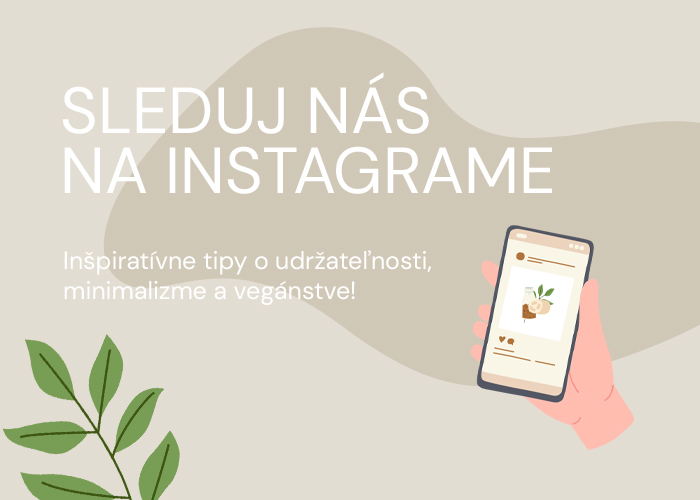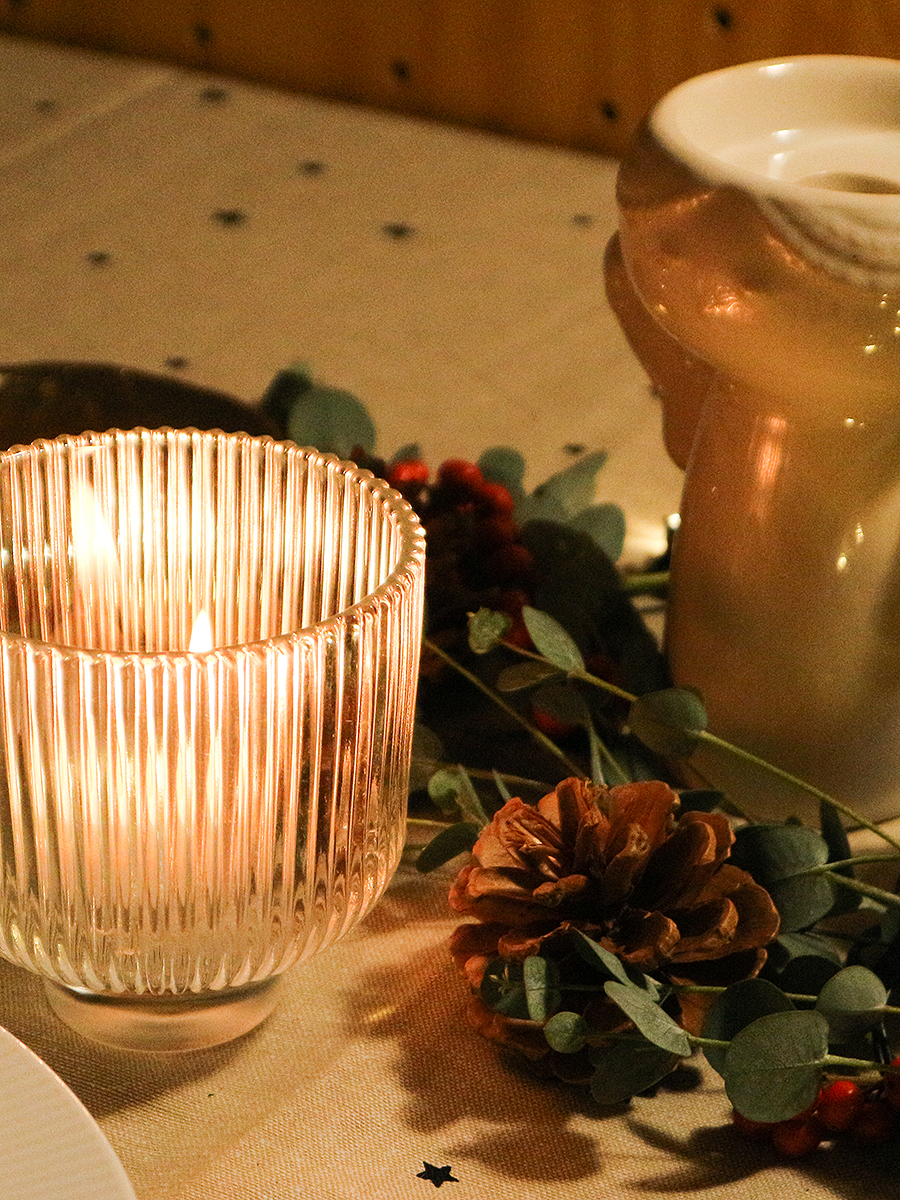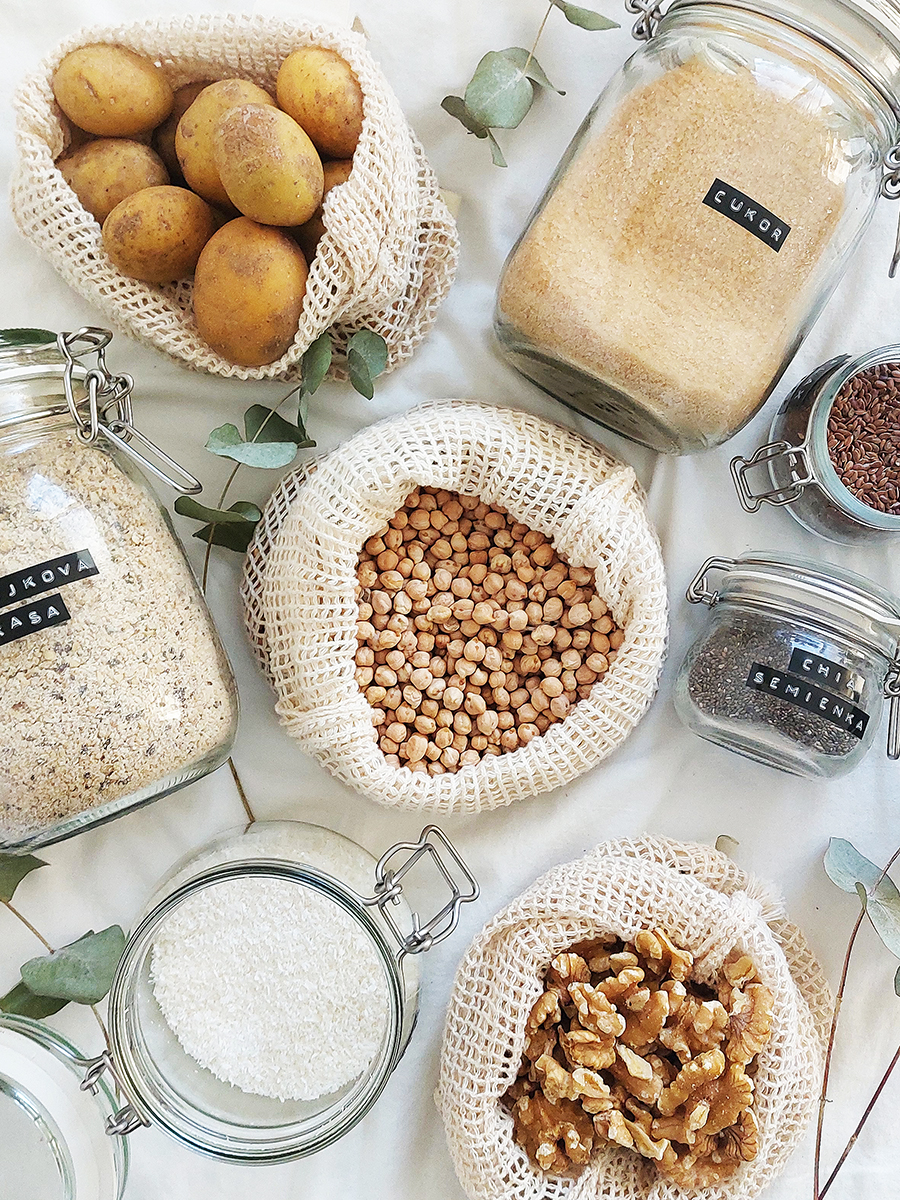
I bring my own bag to the store. I use fabric produce bags for fruit and vegetables instead of plastic ones. I have a bamboo toothbrush. I use cosmetics sold in paper, glass or without packaging. I refuse straws. I avoid single use products. I buy durable food in package free stores. I only buy new clothes when I really need it. I look for better alternatives to everyday products that are made from sustainable materials, are compostable or recyclable. I eat vegan food.
I’m trying to everything I can to at least a bit help our planet. But sometimes I find myself in a situation where I can’t prevent the thoughts of whether it’s actually worth it. It’s just one plastic wrapper. One cake with creamy filling. One new shirt. Because of them, the Earth won’t stop spinning. And I’m certainly not the only one, who occasionally waves their hand and buys something in the plastic or with animal products without big regrets.
So is it even worth it to try? Make an effort to bring our own packaging everywhere, buy clothes made of organic materials that have been ethically made, or avoid everything that contains milk, eggs or meat? Can one person make a change?
Yes. And I’ll tell you why.

Each day, a person on a vegan diet saves 4,164 litres of water, 20 kilograms of grain, 3 square metres of forest, 9 kilograms of CO2 emmisions. And one animal.
The animal industry uses a huge amount of water not only to produce food for the animals, but also for further processing of meat; whereas, of course, they need fields and pastures for these crops, and they have to cut down forests, and this entire long process produces hundreds of kilograms of emissions. And all of this for one lunch. One yogurt. One scrambled eggs. An animal has to die to feed us – either because it simply has to die to be on the plate, or the death is a side effect. I may not even have to talk about the terrible conditions in which cattle, hens or pigs live. That’s why they die much earlier than they should.
If you don’t care about the used water or some emissions, before you order a steak in a restaurant, think for a second what are you actually ordering. “But the animal is alread dead. And if I don’t eat it, someone else will.“
Well, yes. But let’s put it in a simple example – let’s say that in a store shops exactly one hundred people and each one buys chicken breasts every day. One hundred packs of meat arrive in the shop every morning. However, if one person doesn’t buy the chicken breast one day, they’ll stay on the shelf by the evening. If the situation recurs, one stops eating chicken, after some time, the daily order of breasts to the store will have to change, because the management will find it meaningless to order a hundred packages, if every evening they have one extra. They order only 99. Somewhere on the outskirts of the city, where they breed chickens, kill them every day, remove the feathers, cut them and pack them, they find that they don’t have to kill a hundred hens, but only 99, because one still remains for them because the store doesn’t buy it. So the chicken will stay alive. But in the meantime, nine other people who shop at the store stopped eating meat. Thus, the store only orders 90 packs of chicken breasts; and the farm also kills ten hens less than usual. In order to not have too many hens, they had to take other measures – and reduce the number of hatched new chicks. If all people stopped eating chicken breasts, the store won’t order them at all and the farm will have to be closed down, because it will lose its meaning.
Of course, the example is completely simplified. But perhaps you see a point – even one person can influence the manufacturer.

The same applies to the production of plastics, disposable products, foods that don’t need packaging but still have it, food waste and so on. One plastic bag may not seem like a lot, but if you don’t take it, it’s like it’s “left” there by the end of the day. If one hundred people don’t take it, one whole roll will be saved and next month the supermarket orders less of them. If no one takes the bag, the supermarket won’t offer them at all, the production in the factory will drop and, after all, they will use less oil – because the same amount will no longer be needed.
We can also look at it from the other side – by not buying a plastic packaging or a one-time thing, it won’t end up in a landfill where it never breaks down; and it won’t end up in the ocean where a sea turtle doesn’t choke your plastic bag when mistaking it with a jellyfish.
The same is in fast fashion. By reducing the demand for cheap clothing, its production will drop. As a result, large chains will have to close down factories in developing countries and hundreds of women will lose their jobs. This may seem like a possible result; but before this happens (because the chances of fast-fashion chains like Zara, Bershka or H&M ending up in a few million loss all of a sudden and releasing all employees who have made hundreds of clothes just the day before are really really low), companies will look for the reason people stopped buying their clothes. And when they find out that there’s an interest in ethically produced pieces where people get a normal salary from which they can actually live, clothing that doesn’t contain chemicals and toxic substances, and whose production doesn’t use polyester or cotton impregnated with pesticides. And they will implement the same strategy. Of course, it may happen that the chains will only proclaim that they have made these changes, but when we consider how fast people would found out about it, they probably wouldn’t even risk it.

What needs to change are companies and corporations. Because these are the ones that emit toxins into the rivers, they emit emmisions into the air, destroy forests and plantations. The footprint left by one person can’t even be compared to it.
But we vote with our money. What we buy – we support. By buying cheap meat, we support cruelty, inhumane behaviour, tiny cages. By buying eggs we support grinding freshly hatched roosters alive. By buying cheap clothes we support low salaries, sixteen-hour working hours, violence. By buying plastic we kill innocent animals and destroy nature.
One person won’t make any huge change. But no one is alone. Every step counts. Any small change helps to make a difference. Even one vegan meal a week, one visit to a package free store, your own bag or not buying a cheap T-shirt is a step towards a better future.

Do obchodu si nosím vlastnú tašku. Namiesto mikroténových vreciek na ovocie a zeleninu používam látkové. Mám bambusovú zubnú kefku. Požívam kozmetiku predávanú v papieri, skle alebo bez obalu. Odmietam slamky. Vyhýbam sa jednorazovým produktom. Trvanlivé potraviny kupujem v bezobalových obchodoch. Nové oblečenie kupujem iba vtedy, keď ho naozaj potrebujem. Vyhľadávam lepšie alternatívy každodenných produktov, ktoré sú vyrobené z udržateľných materiálov, sú kompostovateľné alebo sa dajú recyklovať. Jem iba vegánsku stravu.
Snažím sa robiť všetko, čo je v mojich silách, aby som aspoň nejako pomohla našej planéte. No aj ja sa niekedy ocitnem v situácii, kedy neviem zabrániť myšlienke, či to má vôbec zmysel. Veď je to len jeden obal. Jeden koláčik s krémovou plnkou. Jedno nové tričko. Kvôli nim sa predsa svet točiť neprestane. A určite nie som sama, ktorá občas iba mávne rukou a bez veľkých výčitiek si kúpi niečo v plaste alebo so živočíšnymi produktami.
Má teda zmysel snažiť sa? Vynakladať úsilie na to, aby sme si všade nosili vlastné obaly, kupovali oblečenie z organických materiálov, ktoré bolo eticky vyrobené, alebo sa oblúkom vyhýbali všetkému, čo obsahuje mlieko, vajcia alebo mäso? Dokáže jeden človek spraviť zmenu?
Áno. A hneď vám poviem prečo.

Každý deň zachráni človek na vegánskej strave 4 164 litrov vody, 20 kilogramov plodín (ako obilniny a zrno), 3 metre štvorcové lesa, 9 kilogramov emisií CO2. A jedno zviera.
Živočíšny priemysel spotrebuje obrovské množstvo vody nielen na produkciu potravy pre zvieratá, ale aj na ďalšie spracovanie mäsa; pričom, samozrejme, na tieto plodiny potrebujú polia a pasienky, kvôli ktorým musia vyrúbať lesy, no a celý tento dlhý proces vyprodukuje stovky kilogramov emisií. A to všetko kvôli jednému obedu. Jednému jogurtu. Jednej praženici. Kvôli tomu, aby sme sa my najedli, zomrie zviera – či už preto, lebo jednoducho zomrieť musí, aby sa na tom tanieri ocitlo, alebo je smrť vedľajší výsledok. O hrozných podmienkach, v akých žije dobytok, sliepky alebo prasatá už snáď ani nemusím hovoriť. Aj kvôli tomu umierajú oveľa skôr, ako by mali.
Ak vás spotrebovaná voda alebo nejaké emisie nezaujímajú, predtým, ako si v reštaurácii objednáte rezeň, zamyslite sa aspoň na sekundu na to, čo si vôbec objednávate. “Ale to zviera je už mŕtve. A ak ho nezjem ja, zje ho niekto iný.“
To áno. No skúsme si to dať do vzorového príkladu – povedzme, že v obchode nakupuje presne sto ľudí a každý z nich si každý deň kúpi kuracie prsia. Do obchodu teda každé ráno dorazí presne sto balení mäsa. Ak si však jedna osoba jeden deň kuracie prsia nekúpi, večer ostanú sedieť na pulte. Ak sa situácia bude opakovať, teda jeden prestane jesť kuracie mäso, po istom čase sa bude musieť zmeniť každodenná objednávka pŕs do obchodu, pretože vedenie zistí, že nemá zmysel objednávať sto balení, ak im každý deň ostane jedno. Objedná iba 99. Kdesi na okraji mesta, kde chovajú sliepky, každý deň ich zabíjajú, zbavujú peria, naporcujú a zabalia, zistia, že nemusia usmrtiť sto sliepok, ale stačí iba 99, pretože tá jedna im aj tak ostane, pretože ju obchod nekúpi. Sliepka teda ostane nažive. Lenže medzitým prestalo jesť mäso ďalších deväť osôb, ktoré v obchode nakupuje. Obchod teda odoberá už len 90 balení kuracích pŕs; a farma tiež zabíja o desať sliepok menej ako zvyčajne. Aby sliepok nemali prebytok, museli vykonať aj ďalšie opatrenia – a znížili počet vyliahnutých nových kuriat. Ak by prestali jesť kuracie prsia všetci, obchod ich nebude vôbec odoberať a farmu zatvoria, pretože stratí svoj význam.
Samozrejme, že príklad je úplne zjednodušený. Ale snáď vidíte pointu – aj jedna osoba dokáže ovplyvniť výrobcu.

To isté platí i o produkcii plastov, jednorazových výrobkov, potravinách, ktoré nepotrebujú obal, ale majú ho, plytvaní jedlom a podobne. Jedno plastové vrecko sa možno nezdá byť veľa, ale ak si ho nevezmete vy, akoby tam “ostalo” na konci dňa. Ak si ho nevezme sto ľudí, ušetrí sa jedna celá rolka a na budúci mesiac objedná supermarket o toľko menej. Ak si vrecko nevezme nikto, supermarket ich nebude vôbec odoberať, klesne produkcia aj vo výrobni a koniec-koncov aj vyťažia menej ropy – pretože už nebude potrebné rovnaké množstvo.
Pozrieť sa na to môžeme aj z druhej strany – vďaka tomu, že si vy plastový obal alebo jednorazovú vec nekúpite, neskončí na skládke, kde sa nikdy nerozloží; a neskončí v oceáne, kde sa s vašim plastovým vreckom nezadusí morská korytnačka, ktorá si ho pomýli s medúzou.
Rovnaké je to aj pri rýchlej móde. Znížením dopytu po lacnom oblečení klesne aj jeho produkcia. Kvôli tomu budú musieť veľké reťazce zavrieť fabriky v rozvojových krajinách a stovky žien prídu o prácu. To sa môže zdať ako možný výsledok; no skôr, ako k tomu dôjde (pretože šanca, že zo dňa na deň budú fast fashion reťazce ako Zara, Bershka alebo H&M v niekoľkomiliónovej strate a kvôli tomu budú musieť prepustiť všetkých zamestnancov, ktorí deň dozadu ešte vyrábali stovky oblečenia, je naozaj veľmi veľmi nízka), budú spoločnosti hľadať dôvod, prečo si ľudia prestali kupovať ich oblečenie. A keď prídu na to, že je záujem o eticky vyrobené kúsky, kde ľudia dostanú normálny plat, z ktorého vedia aj reálne vyžiť, oblečenie, ktoré v sebe neobsahuje chemikálie a toxické látky, a pri ktorého výrobe sa nepoužíva polyester alebo bavlna napustená pesticídmi. A zavedú rovnakú stratégiu. Samozrejme, že môže nastať to, že reťazce budú iba proklamovať, že spravili tieto zmeny, ale keď vezmeme do úvahy to, ako rýchlo by sa im na to prišlo, asi by sa im klamať neoplatilo.

To, čo sa musí zmeniť, sú spoločnosti a korporácie. Pretože tie sú práve tie, ktoré do riek vypúšťajú toxíny, do vzduchu emisie, ničia lesy a plantáže. Stopa, ktorú za sebou nechá jeden človek, sa oproti tomu nedá ani porovnať.
No volíme svojimi peniazmi. Čo kupujeme – to podporujeme. Kúpou lacného mäsa podporujeme týranie, nehumánny prístup, stiesnené klietky. Kúpou vajec podporujeme mletie čerstvo vyliahnutých kohútikov zaživa. Kúpou lacného oblečenia podporujeme nízke platy, šestnásť hodinový pracovný čas, násilie. Kúpou plastov zabíjame nevinné zvieratá a ničíme prírodu.
Jedna osoba nejakú obrovskú zmenu nespraví. No nikto nie je sám. Každý krok sa počíta. Každá malá zmena pomáha spraviť rozdiel. Aj jedno vegánske jedlo týždenne, jedna návšteva v bezobalovom obchode, vlastná taška alebo nekúpenie lacného trička je krokom k lepšej budúcnosti.





